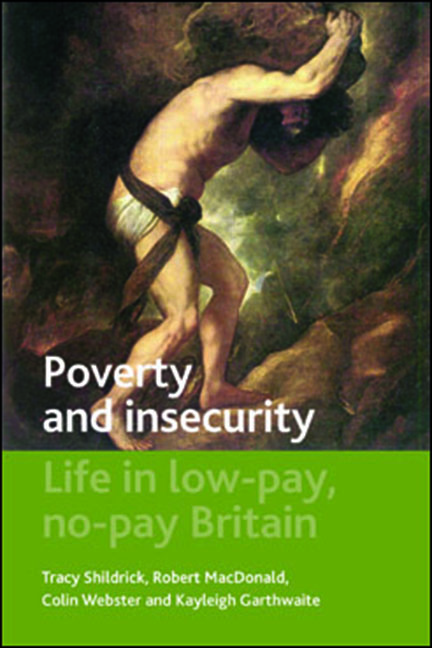Book contents
- Frontmatter
- Contents
- List of figures and boxes
- Acknowledgements
- 1 Introduction
- 2 Poor work, welfare and poverty
- 3 Researching the low-pay, no-pay cycle and recurrent poverty
- 4 The low-pay, no-pay cycle: the perspectives and practices of employers and ‘welfare to work’ agencies
- 5 The low-pay, no-pay cycle: its pattern and people's commitment to work
- 6 Searching for jobs: qualifications, support for the workless and the good and bad of informal social networks
- 7 Poor work: insecurity and churning in deindustrialised labour markets
- 8 ‘The ties that bind’: ill health and caring and their impact on the low-pay, no-pay cycle
- 9 Poverty and social insecurity
- 10 Conclusions
- References
- Index
6 - Searching for jobs: qualifications, support for the workless and the good and bad of informal social networks
Published online by Cambridge University Press: 07 September 2022
- Frontmatter
- Contents
- List of figures and boxes
- Acknowledgements
- 1 Introduction
- 2 Poor work, welfare and poverty
- 3 Researching the low-pay, no-pay cycle and recurrent poverty
- 4 The low-pay, no-pay cycle: the perspectives and practices of employers and ‘welfare to work’ agencies
- 5 The low-pay, no-pay cycle: its pattern and people's commitment to work
- 6 Searching for jobs: qualifications, support for the workless and the good and bad of informal social networks
- 7 Poor work: insecurity and churning in deindustrialised labour markets
- 8 ‘The ties that bind’: ill health and caring and their impact on the low-pay, no-pay cycle
- 9 Poverty and social insecurity
- 10 Conclusions
- References
- Index
Summary
Introduction
We now turn to the processes and practices that underlay participants’ experiences of searching for work. The formal services provided through the state, voluntary and private sectors to help the workless into jobs are described, from the point of view of our interviewees. A key finding of the chapter, with implications for social policy and practice in this area, is that the informal methods and practices of job searching tended to prove more successful in locating jobs but, as a corollary, tended to limit people to the poor work done by others in their social networks. We begin, however, by describing the educational backgrounds, skills and qualifications that people brought to the labour market.
Education, skills and qualifications
In Chapter 5 we documented the strength of the sample's motivation to work. This strong commitment to employment was not matched by high levels of education, qualifications and skill. Overall, these were relatively low level. Virtually all had left school at minimum school leaving age and many had had disappointing experiences of school, typically leaving with a few low level passes at GCSE (or their equivalent predecessors). The reasons for working-class educational underachievement are well documented (Evans, 2007) and our interviewees gave depressingly familiar explanations, for instance: of the perceived irrelevance of the curricula (and, for some, of educational qualifications per se); of being bullied and victimised (by pupils or teachers); of problems in their wider lives not being recognised or appropriately cared for by school; of pupil cultures that encouraged educational disengagement and truancy; and of poor-quality teaching and educational provision in schools that failed to provide a successful education comprehensively to all pupils (see MacDonald and Marsh, 2005). This is not to say that all were low qualified and low skilled. Some of the older men were skilled tradesmen, having completed apprenticeships early in their working lives. A handful of people also possessed higher level educational credentials: undergraduate diplomas or degrees.
A second point of note is that negative experiences of secondary school did not set negative attitudes to education in stone and a good number returned later to some sort of post-16 education or training.
- Type
- Chapter
- Information
- Poverty and InsecurityLife in Low-Pay, No-Pay Britain, pp. 101 - 124Publisher: Bristol University PressPrint publication year: 2012



